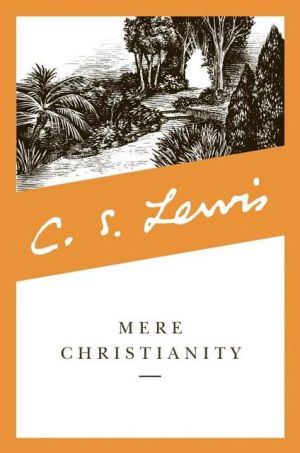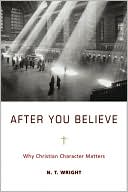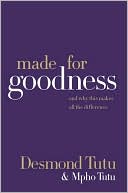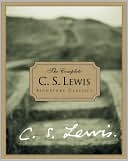Mere Christianity
The most popular of C. S. Lewis' works of nonfiction, Mere Christianity has sold several million copies worldwide. It brings together Lewis' legendary broadcast talks of the war years, talks in which he set out simply to "explain and defend the belief that has been common to nearly all Christians at all times." Rejecting the boundaries that divide Christianity's many denominations, Lewis finds a common ground on which all Christians can stand together, and provides an unequaled opportunity...
Search in google:
A forceful and accessible discussion of Christian belief that has become one of the most popular introductions to Christianity and one of the most popular of Lewis's books. Uncovers common ground upon which all Christians can stand together. Times Literary Supplement He has a unique power for making theology an attractive, exciting, and fascinating quest.
Mere Christianity\ Chapter One\ The Law of Human Nature\ Every one has heard people quarrelling. Sometimes it sounds funny and sometimes it sounds merely unpleasant; but however it sounds, I believe we can learn something very important from listening to the kind of things they say. They say things like this: 'How'd you like it if anyone did the same to you?' — 'That's my seat, I was there first' — 'Leave him alone, he isn't doing you any harm' — 'Why should you shove in first?' — 'Give me a bit of your orange, I gave you a bit of mine' — 'Come on, you promised.' People say things like that every day, educated people as well as uneducated, and children as well as grown-ups.\ Now what interests me about all these remarks is that the man who makes them is not merely saying that the other man's behaviour does not happen to please him. He is appealing to some kind of standard of behaviour which he expects the other man to know about. And the other man very seldom replies: 'To hell with your standard.' Nearly always he tries to make out that what he has been doing does not really go against the standard, or that if it does there is some special excuse. He pretends there is some special reason in this particular case why the person who took the seat first should not keep it, or that things were quite different when he was given the bit of orange, or that something has turned up which lets him off keeping his promise. It looks, in fact, very much as if both parties had in mind some kind of Law or Rule of fair play or decent behaviour or morality or whatever you like to call it, about which they really agreed. And theyhave. If they had not, they might, of course, fight like animals, but they could not quarrel in the human sense of the word. Quarrelling means trying to show that the other man is in the wrong. And there would be no sense in trying to do that unless you and he had some sort of agreement as to what Right and Wrong are; just as there would be no sense in saying that a footballer had committed a foul unless there was some agreement about the rules of football.\ Now this Law or Rule about Right and Wrong used to be called the Law of Nature. Nowadays, when we talk of the 'laws of nature' we usually mean things like gravitation, or heredity, or the laws of chemistry. But when the older thinkers called the Law of Right and Wrong 'the Law of Nature', they really meant the Law of Human Nature. The idea was that, just as all bodies are governed by the law of gravitation, and organisms by biological laws, so the creature called man also had his law — with this great difference, that a body could not choose whether it obeyed the law of gravitation or not, but a man could choose either to obey the Law of Human Nature or to disobey it.\ We may put this in another way. Each man is at every moment subjected to several different sets of law but there is only one of these which he is free to disobey. As a body, he is subjected to gravitation and cannot disobey it; if you leave him unsupported in mid-air, he has no more choice about falling than a stone has. As an organism, he is subjected to various biological laws which he cannot disobey any more than an animal can. That is, he cannot disobey those laws which he shares with other things; but the law which is peculiar to his human nature, the law he does not share with animals or vegetables or inorganic things, is the one he can disobey if he chooses.\ This law was called the Law of Nature because people thought that every one knew it by nature and did not need to be taught it. They did not mean, of course, that you might not find an odd individual here and there who did not know it, just as you find a few people who are colour-blind or have no ear for a tune. But taking the race as a whole, they thought that the human idea of decent behaviour was obvious to every one. And I believe they were right. If they were not, then all the things we said about the war were nonsense. What was the sense in saying the enemy were in the wrong unless Right is a real thing which the Nazis at bottom knew as well as we did and ought to have practised? If they had had no notion of what we mean by right, then, though we might still have had to fight them, we could no more have blamed them for that than for the colour of their hair.\ I know that some people say the idea of a Law of Nature or decent behaviour known to all men is unsound, because different civilisations and different ages have had quite different moralities.\ But this is not true. There have been differences between their moralities, but these have never amounted to anything like a total difference. If anyone will take the trouble to compare the moral teaching of, say, the ancient Egyptians, Babylonians, Hindus, Chinese, Greeks and Romans, what will really strike him will be how very like they are to each other and to our own. Some of the evidence for this I have put together in the appendix of another book called The Abolition of Man; but for our present purpose I need only ask the reader to think what a totally different morality would mean. Think of a country where people were admired for running away in battle, or where a man felt proud of double-crossing all the people who had been kindest to him. You might just as well try to imagine a country where two and two made five. Men have differed as regards what people you ought to be unselfish to — whether it was only your own family, or your fellow countrymen, or every one. But they have always agreed that you ought not to put yourself first. Selfishness has never been admired. Men have differed as to whether you should have one wife or four. But they have always agreed that you must not simply have any woman you liked...\ Mere Christianity. Copyright (c) by C. Lewis . Reprinted by permission of HarperCollins Publishers, Inc. All rights reserved. Available now wherever books are sold.
PrefaceForewordBk. 1Right and Wrong as a Clue to the Meaning of the Universe1The Law of Human Nature32Some Objections93The Reality of the Law164What Lies Behind the Law215We Have Cause to Be Uneasy28Bk. 2What Christians Believe1The Rival Conceptions of God352The Invasion403The Shocking Alternative474The Perfect Penitent535The Practical Conclusion60Bk. 3Christian Behaviour1The Three Parts of Morality692The 'Cardinal Virtues'763Social Morality824Morality and Psychoanalysis885Sexual Morality946Christian Marriage1047Forgiveness1158The Great Sin1219Charity12910Hope12911Faith13812Faith144Bk. 4Beyond Personality: Or First Steps in the Doctrine of the Trinity1Making and Begetting1532The Three-Personal God1603Time and Beyond Time1664Good Infection1725The Obstinate Toy Soldiers1786Two Notes1837Let's Pretend1878Is Christianity Hard or Easy?1959Counting the Cost20110Nice People or New Men20711The New Men218
\ Sunday Patriot News HarrisburgThis is an incredibly lucid and unprejudiced work... Read slowly and carfully by Geoffrey howard, the audio version is an easy way to follow Lewis' reasoning.\ \ \ \ \ PA) Sunday Patriot News (HarrisburgThis is an incredibly lucid and unprejudiced work... Read slowly and carfully by Geoffrey howard, the audio version is an easy way to follow Lewis' reasoning.\ \ \ John UpdikeI read Lewis for comfort and pleasure many years ago, and a glance into the books revives my old admiration.\ \ \ \ \ Anthony BurgessC. S. Lewis is the ideal persuader for the half-convinced, for the good man who would like to be a Christian but finds his intellect getting in the way. \ —New York Times Book Review\ \ \ \ \ New YorkerIf wit, and wisdom, style and scholarship are requisites to passage through the pearly gates, Mr. Lewis will be among the angels.\ \ \ \ \ Chad WalshApparently this oxford don and Cambridge professor is going to be around for a long time; he calls himself a dinosaur but he seems to speak to people where they are. —The Washington Post Book World\ \ \ \ \ Los Angeles TimesLewis, perhaps more than any other twentieth-century writer, forced those who listened to him and read his works to come to terms with their own philosophical presuppositions.\ \ \ \ \ Los Angeles TimesLewis, perhaps more than any other twentieth-century writer, forced those who listened to him and read his works to come to terms with their own philosophical presuppositions.\ \ \ \ \ Times Literary SupplementHe has a unique power for making theology an attractive, exciting, and fascinating quest.\ \ \ \ \ Harper'sThe point about reading C. S. Lewis is that he makes you sure, whatever you believe, that religion accepted or rejected means something extremely serious, demanding the entire energy of mind.\ \ \ \ \ Times Literary SupplementHe has a unique power for making theology an attractive, exciting, and fascinating quest.\ \ \ \ \ New YorkerIf wit, and wisdom, style and scholarship are requisites to passage through the pearly gates, Mr. Lewis will be among the angels.\ \ \ \ \ Library JournalThe late Lewis, Oxford professor, scholar, author, and Christian apologist, presents the listener with a case for orthodox Christianity. This is definitely not the shouting, stomping, sweating, spitting televangelist fare so often parodied; Lewis employs logical arguments that are eloquently expressed. He describes those doctrines that the four major denominations in Britain (Anglican, Methodist, Presbyterian, and Roman Catholic) would have in common, e.g., original sin, the transcendent Creator God, and the divinity of Jesus as well as his atonement and bodily resurrection. Geoffrey Howard reads both works, and his performance is superb; he is clear and unhurried, giving just the right emphasis and/or inflection. The volume on the Blackstone edition is recorded at a higher level than HarperAudio's. Otherwise there were no perceived differences in the recordings. If your institution can afford it, the Blackstone production would be preferred because of its sturdy case and the announcement of side changes. Whether or not one agrees with Lewis's arguments, it is a pleasure to hear such a skillful reading of an eloquent work. Public libraries as well as institutions that teach religion/theology or speech should consider. Michael T. Fein, Central Virginia Community Coll., Lynchburg Copyright 2001 Cahners Business Information.\ \ \ \ \ Books & Culture"As we witness Lewis develop we find that these volumes are working as a kind of unconscious autobiography."\ \







